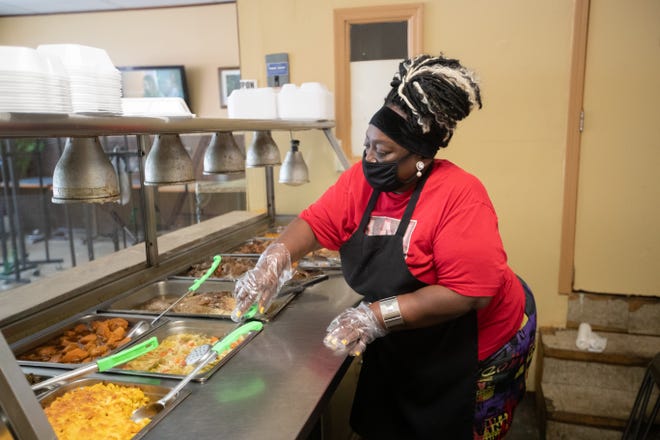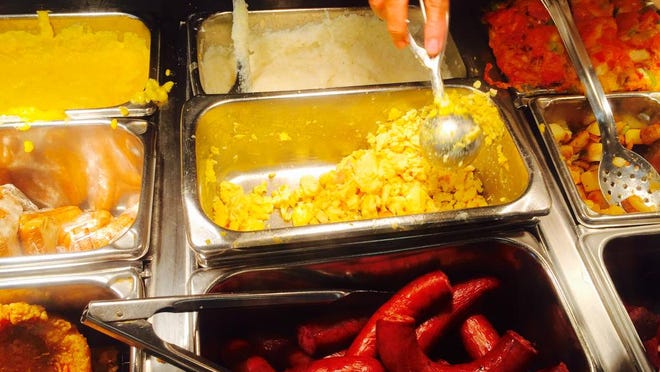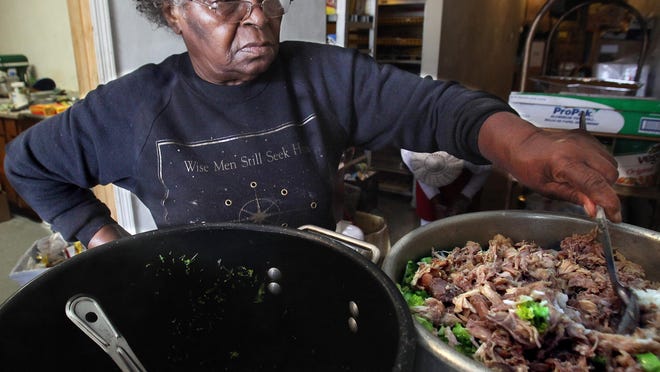Soul food stays alive in Tallahassee through community efforts
“I think soul food begins with the sun,” David Ritchey said.
Ritchey, 32, works a five-acre farm in Quincy with his girlfriend, Angelique Taylor. The duo’s aim is to heal the soil and teach others the importance of economic sustainability.
“When I eat food fresh from the garden, I feel like I’m eating the energy the food was metabolizing before I ate it,” he said.
They grow seasonal and perennial crops such as collard greens, African spinach, tomatoes and buckwheat to sell at community farmers markets, including Saturdays at the Frenchtown Farmers Market in Tallahassee. Their crops make up the basics of a soul food dish, the pièces de resistance of southern African American cooking.
Thanksgiving memories:The meaning of Thanksgiving: Memories filled with life and lessons
Restaurants:Order up: Some Tallahassee restaurants are staying open for Thanksgiving
Sweet Potato Pie:Eyes on the pies: Sweet potato dessert completes a Southern Thanksgiving meal
Southerners will typically name soul food as: fried chicken, macaroni and cheese, and collard greens. But soul food comes with as much variety as the people who cook it, and the differences between “soul” food and “southern” food depend on who you’re talking to.
The basics: a meat, a starch, a vegetable. Spices and herbs. But what gives it soul?
In a conversation between two chefs talking to the New York Times, one suggested soul was introduced as a term when Black Americans brought their cooking with them into the American North and “soul” became the way white Northerners identified the cooking. Another chef suggested Southern or “country” cooking was when a Southern white cook made the food, while “soul” referred to a Southern Black cook’s food.
One other hypothesis about the phrase is that the phrase leapt from jazz music to the kitchen — “soul” music and “soul” food.

Making meals good for the heart, good for the body
In February, Ritchey and Taylor sat in the comfort of their own home to be interviewed via Zoom.
“Soul food is two parts: coming together with the family, but some of it is the health choices that affect us in the long run,” Ritchey said.
This food that comforts the soul can be a burden on the body.

Common to most homemade soul food dishes are garlic, onions, peppers, paprika, and bay leaves. Also — brown sugar, unsalted butter, pork fat, milk, rice, pasta and cheeses. Ingredients are fried and baked high or simmered, low and slow. Collard greens, cornbread, macaroni and cheese, the list continues for the mouthwatering meals.
But with the hearty, southern-style diet comes the higher risk for high blood pressure — and soul food introduces this higher risk among a demographic of people already considered more at risk than others.
Ritchey and Taylor are taking on this risk by making their soul food meals plant-based, making the dishes good for the soul and the heart.
“A lot of (soul food dishes are) already 70-80% vegetarian,” Ritchey said. “For instance, collard greens — we usually put ham or ham hocks in there but if you take that out (it’s vegetarian).”
A good variety of soul food comes in the rich shades of vegetables — golds, yellows, browns and greens of okra, jalapeños, sweet potatoes, radishes, carrots, black-eyed peas. Accents of red and purples peek through in certain dishes.
“The seasonings — black pepper, salt, cayenne pepper. Black eyed peas, (the dish) by itself is vegetarian,” Taylor said.
The farming duo explained certain dishes such as barbecued mushrooms, black-eyed peas and collard greens they’ve turned vegan.
“I think soul food is really about being creative, that’s the root of it. Taking what we had and we can step it up, and think about what we’re putting into our bodies and creatively do that,” Taylor said.
Soul food, from then to now
The roots of soul food today begin with native African crops. Okra, for instance, is one plant brought over during the Transatlantic Slave Trade.
Crops like okra, jalapeños, sweet potatoes, radish, carrots, black eyed peas and more are grown across community farms in Tallahassee.
Soul Food restaurant:Soul sisters: Gilliam Sisters open soul food restaurant on Tallahassee’s west side
Thanksgiving meals:Project Annie is cooking and looking for help with 2021 community Thanksgiving meal
Other dishes common to soul food kitchens mirror African dishes.
Jollof is a traditional western African dish made with long-grain rice, onions, peppers, spices, a meat of choice and tomatoes that gives it a vibrant, red color.
The recipe may differ depending on which country’s recipe is used, and Jollof-cooking comparisons are popular amongst Senegalese, Ghanaian and Nigerian people.
The cornerstones for both dishes: rice, tomato stew and the seasonings.

Jambalaya, with its roots in Louisiana, also is a similar dish to Jollof. The Cajun or Creole kitchen uses what one writer on food blog VeeTee.com called the “holy trinity” — onions, peppers and celery — cooked with meats, tomatoes, stock and rice.
One other example of soul food’s origins: barbecue, perhaps a sub-genre of soul food itself. Africans, enslaved and brought to the Americas, brought with them the techniques for preserving underside cuts of pig, which included the head, feet, intestines and ribs, according to food website BlackFood.co.
And “gumbo,” the dish primed for any coastal southern stovetop, especially if that stove is in New Orleans, may come from a Bantu dialect’s word “ki ngombo,” which means okra.

Kitchen memories
During an interview, 38-year-old activist and community icon Talethia Edwards recalled a time in college where she was affectionately known as “Mama T.”
“Because I was that one that cooked that good soul food in college. We didn’t have our mommas right? No one was cooking for us, so I was that person,” she said. “Sometimes I commemorate that. I’ll go (‘live’ on Instagram) as I cook on Sundays. ‘Hey, this is how we do it. We cook big meals for our family.’”
Edwards is president of the Bond Neighborhood Association in Tallahassee and a mother to eight. She’s a reflection of the Black aunties, grandmothers and women whose skills never go unnoticed.
Traditionally, African Americans gathered for soul food meals after emotionally charged occasions — like after a good church service or mourning the loss of a community member.
“That’s an act of caring and love. It can be grievances and celebration; it can be so many things. I don’t think it’s exclusive to Black people, but we are the creators and innovators of soul food. We are the distributors of soul food,” Edwards said.
Soul food is heavy on the plate and stomach, but can lift spirits in one bite.
“I think other people enjoy soul food and cook soul food, but when we say soul food it’s not just about the dishes we prepare — it’s about what goes around the food,” Edwards said.
Soul food kitchens bring to mind moms, grandmothers, aunts and cousins bustling through. A child may be assigned to watch a pot or bring a side dish to completion. Gossip surrounds activities, or plans for the next week. News is spread and emotions shared.
Napkins, silverware and serving utensils are all in motion, shared across the dinner table. A community’s bond strengthens over food.
Even on the phone with a reporter, Edwards sounds like a mother.
“(Soul food) is home, it is love — it smells and tastes of memories,” she said.
Ariyon Dailey participates in the Florida Student News Watch. This story was edited by CD Davidson-Hiers. Email [email protected].
A sampling of soul food restaurants in Tallahassee
Auntie’s Kitchen, 1815 S Adams St #3
Ms. Dee’s Kitchen, 717 Old Bainbridge Rd · In Ferrell’s Place
Earley’s Kitchen, 1458 S Monroe St
Gilliam Sisters Soul Food, 1710 W. Tharpe St.
Hip Hop Fish & Chicken, 1350 Mahan Drive, unit F
Kacey’s Buffet, 2545 N. Monroe St.
Ma Mary’s Kitchen, 614 Eugenia St.
Olean’s Cafe, 1605 S Adams St.
Community Thanksgiving meals
The Salvation Army: Thanksgiving meal is on Wednesday, Nov. 24, at 2410 Allen Road. It will be served from 11 a.m.-2 p.m. Social distancing measures will be in place and a face mask is required except at the dining table.
Project Annie: This will be the 23rd year Annie Johnson has cooked and coordinated a Thanksgiving Day dinner for people in the Frenchtown neighborhood. From 11 a.m.-2 p.m. Thursday, Nov. 25. Project Annie we will be serving close to 1,000 people in the greater Frenchtown area at Project Annie, 625 W. 4th Ave. Donations of food will be received up until Wednesday prior to Thanksgiving. Visit projectannieinc.com or call 850-222-6133.










